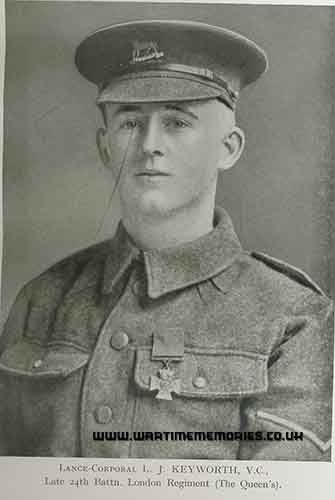Additions will be checked before being published on the website and where possible will be forwarded to the person who submitted the original entries. Your contact details will not be forwarded, but they can send a reply via this messaging system.
please scroll down to send a message
L/Cpl. Leonard James Keyworth VC.
British Army 24th (The Queens) Btn. London Regiment
from:Lincoln
(d.19th Oct 1915)
An extract from the London Gazette, dated 2nd July, 1915, records the following:- "For most conspicuous bravery at Givenchy on the night of 25-26th May, 1915. After the assault on the German position by the 24th Battalion, London Regt, efforts were made by that Unit to follow up their success by a bomb attack, during the progress of which 58 men out of a total 75 became casualties. During this very fierce encounter Lance-Cpl Keyworth stood fully exposed for 2 hours on the top of the enemy's parapet, and threw about 150 bombs amongst the Germans, who were only a few yards away."
Born in Lincoln on 12th August 1893, Leonard James Keyworth was the son of James and Emma Keyworth of 22 Coningsby Street, Lincoln. He tried to join The Lincolnshire Regiment at the outbreak of war in 1914. Rejected, he successfully joined the 24th County of London Battalion, the London Regiment (the Queen’s) Territorial Force as a private on 16th September 1914. Following six months’ basic training in London, Leonard headed to the front line in France.
On the night of 25th/26th May 1915 the battalion had made a successful assault on a German position and were trying to follow it up with a bomb attack against fierce opposition. In a letter home to his sister, Leonard modestly described his actions on the battlefield. ‘I can tell you we have had a very rough time. We entered the trenches at 6.30 on May 25th, and were told to mount the trenches and commence straight away an attack on the German trenches about 250 yards away. This attack we made without our artillery’s covering fire. Our lads went at it with great determination, and were soon successful. I was with the bombing party, and was the only one to come through without a scratch. I went along a ridge on my stomach and threw bombs into a German trench, my distance being about 15 yards. Men were shot down by my side. Still I continued, and came out safe. I was at once recommended to my officers, who posted it to the colonel. It is supposed to be for bravery, but I cannot understand where it came in, as I only did my duty. But how I came out God only knows. Some of our men who were slightly wounded, and who have come back, could not believe that I came out alive.’
This modest account belies the fact that Leonard was key to the success of the action that day. A fellow soldier recalled seeing Leonard refuse to give in even whilst under heavy enemy fire. He said: 'Seeing that we were done for, Keyworth laid hold of all the bombs he could get, and springing on to the enemy parapet, kept pelting them with bombs just as if he were taking shots at an Aunt Sally. It was a mercy that he escaped, for all the time the Germans were shooting at him madly. He kept it up for over two hours, and his audacity paralysed the whole German counter-attack.â€
Lance Corporal Keyworth received the Victoria Cross from the King at Buckingham Palace in July,1915. After the ceremony, he was interviewed by a reporter from the Daily Mail: "Leonard was given a hero’s welcome.on 14th July 1915 when he returned to Lincoln. Crowds of people flocked to see him as his train arrived in the city and he, his family, the Mayor and Sheriff, were escorted through the streets by the Territorials. The crowds delayed their progress, it took half an hour to get to his home on Coningsby Street The Mayor gave a speech and then Leonard was carried shoulder-high to his door, as the crowds cheered."
Sadly on 19th of October 1915, he was shot in the head and was taken to the Stationary Hospital at Abbeville and died from his wounds, he was just 22. Three days after his death, his final letter home arrived at his parent’s house. It read: ‘I expect you will be wondering what has become of me. We have had quite a busy time. I hope you both are quite well, in fact, all Coningsby Street. How is Lincoln looking now? I wish I could pay it a visit. I am glad to say I am in the best of health and happy to know we are doing our best against the Germans and doing it well… We are fighting as Britons should do, and it is for our King and country.’
